|
|
|
Sort Order |
|
|
|
Items / Page
|
|
|
|
|
|
|
| Srl | Item |
| 1 |
ID:
164500
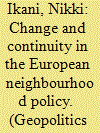

|
|
|
|
|
| Summary/Abstract |
The Ukraine crisis presented a severe geopolitical challenge to European Union (EU) policies in the neighbourhood. This is because during the course of the crisis, Russia openly challenged the EU’s economic and political integration initiatives in the region using economic, informational and eventually military means. As such, the crisis and its escalation has had ramifications across the EU in the fields of security, trade, energy security and regional cooperation. In the wake of the crisis, a clear rhetorical break with previous EU policy was announced by various key actors to respond to these challenges. Yet both the rhetoric and declared ambition for reform in response to the events is not matched by a major revision of actual policy objectives or policy tools. The question at the core of this article is how to explain the changes made to the European Neighbourhood Policy (ENP) following the Ukraine crisis. In order to provide an answer this article will build on historical institutionalism, exploring how two key historical institutionalist insights improve our understanding of the policy changes made to the ENP after the Ukraine crisis: (i) the institutional ‘effects’ and plasticity of the ENP institutions and (ii) temporal contingency. In doing so, this article takes issue with two tendencies in the current literature on policy change in the ENP. First, the lack of analytical engagement with the very notion of policy change, which throughout the literature is rarely defined or conceptualized. Second, the prevailing assumption that one should not be surprised that in the case of ENP reform after the Ukraine crisis there has been little change, due to the prevalence of policy inertia. It is argued that this oversimplifies both policy continuity and policy change. By paying particular attention to the decision-making process preceding change, this article thus aims to shed new light on the issue of EU foreign policy change.
|
|
|
|
|
|
|
|
|
|
|
|
|
|
|
|
| 2 |
ID:
085830
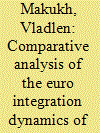

|
|
|
|
|
| Publication |
2008.
|
| Summary/Abstract |
Relations with the European Union within the framework of the European Neighborhood Policy (ENP) are extremely important for the European integration of its partner countries. So researchers can glean something from the experience accumulated in the East European and Caucasian countries' relations with the European Union within the framework of the ENP. This article looks at how a corresponding balance is being found in Ukraine's and the Caucasian countries' relations with the EU based on the results of the European Neighborhood Policy in the Arab Maghreb states (at the EU-Morocco, EU-Tunisia, and EU-Algeria levels).
|
|
|
|
|
|
|
|
|
|
|
|
|
|
|
|
| 3 |
ID:
092877
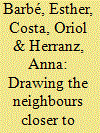

|
|
|
|
|
| Publication |
2009.
|
| Summary/Abstract |
The European Neighbourhood Policy (ENP) launched in 2004 was purposefully conceived as a strategy to encourage neighbours' approximation with the European Union (EU). This aim by the EU to extend its own system of rules beyond member states has become the focal point of the literature on the EU's relations with neighbours. In this article, however, we aim to broaden the scope of the analysis of the EU's role as it pursues policy convergence in the ENP area. More specifically, we argue that the convergence processes can be established on a basis other than EU's norms, namely, international and bilaterally developed norms. Building on this three-fold distinction, we propose a model explaining how and when policy convergence is more likely to happen on the basis of every one of these norms. The model takes into account three variables: the structure of incentives between the EU and its neighbours, mutual perceptions of legitimacy and intra-EU coherence. Based on a number of empirical examples, we illustrate that EU-based convergence is less predominant in EU's relations with its neighbours than it is usually portrayed in the literature.
|
|
|
|
|
|
|
|
|
|
|
|
|
|
|
|
| 4 |
ID:
085513


|
|
|
|
|
| Publication |
2008.
|
| Summary/Abstract |
This article assesses the relations between the European Neighbourhood Policy (ENP) and EU actions in conflict management in the neighbourhood. It is based on a comparative approach to the EU actions towards tie unsolved conflicts in the Maghreb and in Eastern Europe respectively. It argues that the comparative approach may be used to test the ENP with regarded to its ambitions in conflict management.
|
|
|
|
|
|
|
|
|
|
|
|
|
|
|
|
| 5 |
ID:
142780


|
|
|
|
|
| Summary/Abstract |
Over the last twenty years, European Union (EU) actorness at both regional and global scales, has become a fruitful topic of analysis in the field of political science, and more specifically in international relations and political geography. Critical geopolitics dedicated many substantive papers on EU discourses and representations. Our paper aims at providing a complementary way to study texts issued by the EU and to question EU actorness by adopting an approach based on textual analysis. The corpus examined includes the seven communications on the European Neighbourhood Policy (ENP) issued between 2003 and 2013. These communications provide essential information regarding relations between the EU and its immediate neighbours. The textual analysis allows several relevant characteristics of discourses to be highlighted: stability and changes, actors, spaces and scales mentioned. The outcomes of the analysis confirm previous research on the subject: The ENP appears as a bilateral state-centric policy, missing global scale, and neglecting the role of regional powers like Turkey or Russia.
|
|
|
|
|
|
|
|
|
|
|
|
|
|
|
|
| 6 |
ID:
103801
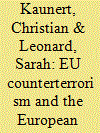

|
|
|
|
|
| Publication |
2011.
|
| Summary/Abstract |
Terrorists trained on European soil, but originating from the Middle East, attacked the world's only superpower on September 11, 2001. Countering this terrorist threat has become an increasingly significant part of European Foreign Policy. At the same time, the European Neighbourhood Policy (ENP) has become an increasingly important dimension of European Foreign Policy. This article examines the extent to which counterterrorism has occupied a prominent place in the ENP, with a particular focus on the Southern Mediterranean ENP partners. The findings of this article suggest that, despite the commonly held view in the literature that security issues, in particular terrorism, have dominated the ENP agenda, counterterrorism cooperation between the European Union (EU) and its Southern Mediterranean ENP partners has not advanced as much as might have been expected.
|
|
|
|
|
|
|
|
|
|
|
|
|
|
|
|
| 7 |
ID:
092152
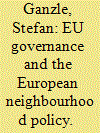

|
|
|
|
|
| Publication |
2009.
|
| Summary/Abstract |
Since 2002 the European Union (EU)1 has sought to flesh out a proximity policy to deal with its immediate vicinity in the light of EU Eastern enlargement. Several labels, such as 'Eastern (and Southern) Dimension', 'Wider Europe', 'European Neighbourhood Policy' (ENP), 'ENP plus' and, eventually-with regards to East European countries outside the EU-'Eastern Partnership' have been used to capture the EU's policy vis-a-vis its different neighbours. So far, Algeria, Israel, the Palestinian Authority, Armenia, Jordan, Syria, Azerbaijan, Lebanon, Tunisia, Ukraine, Egypt, Moldova, Georgia and Morocco have been recognised as 'ENP partner' countries.
|
|
|
|
|
|
|
|
|
|
|
|
|
|
|
|
| 8 |
ID:
190056
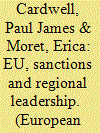

|
|
|
|
|
| Summary/Abstract |
Sanctions have become the “go to” mechanism for addressing foreign and security challenges in the international arena. The European Union’s willingness to impose autonomous (or unilateral) restrictive measures on third countries, and in particular on Russia, has come to the fore at a time when the uptake of new sanctions through the United Nations (UN) framework has stalled. This trend appears to reflect a growing ability to forge consensus among the EU's Member States and use its economic power to support its foreign policy goals. This article considers the extent to which the EU has succeeded in forging a leadership role in sanctions for itself among non-EU states. It examines the alignment or adoption by non-Member States with its sanctions regimes and finds that the EU has a demonstrable claim to regional, if not yet global, leadership.
|
|
|
|
|
|
|
|
|
|
|
|
|
|
|
|
| 9 |
ID:
095014


|
|
|
|
|
| Publication |
2010.
|
| Summary/Abstract |
This article sheds light on the European Union's (EU) efforts to facilitate the fight against corruption and promote good governance through the European Neighbourhood Policy (ENP). Our analysis shows that the level of corruption in the Eastern Neighbourhood is strongly connected to the success of democratic and economic reforms. The ENP theoretically corresponds to the complex nature of the phenomenon by placing equal emphasis on strengthening state institutions, restructuring the economy, and pushing for democratic reforms. As the EU, however, by and large seeks cooperation with state actors and pursues a 'one-size-fits-all' approach mostly based on 'soft' mechanisms such as socialisation and capacity-building, the implementation of politically sensitive reforms seems to be unlikely. Moreover, the EU potentially allows its partner governments to 'pick and chose' from the overall reform agenda and evade real political and economic change towards better governance.
|
|
|
|
|
|
|
|
|
|
|
|
|
|
|
|
| 10 |
ID:
101009


|
|
|
|
|
| Publication |
2010.
|
| Summary/Abstract |
This article argues that the broad security discourse built into the European Union's (EU's) initiatives to the east, and specifically the European Neighbourhood Policy (ENP) and Eastern Partnership (EaP) have in practice not yielded the stability, prosperity and security sought after by the EU. Whilst the EU has pursued bilateral and multilateral processes of engagement through the ENP and EaP, the paradox has remained within its double security narrative and has often resulted in minimal change to the east, as well as contestation from eastern partners and regional actors such as Russia. The conclusion suggests that the EU must provide a more pragmatic, differentiated and balanced narrative, and thus process of engagement with the east if it is serious about creating a zone of peace, stability and prosperity.
|
|
|
|
|
|
|
|
|
|
|
|
|
|
|
|
| 11 |
ID:
100923
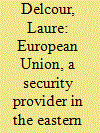

|
|
|
|
|
| Publication |
2010.
|
| Summary/Abstract |
This article analyses the extent to which and the way in which the European Union (EU) has acted as a security provider in its eastern vicinity since the European Neighbourhood Policy was launched. The EU's capacity to emerge as a security provider and the approaches developed in this purpose are gauged against three major EU objectives in the eastern neighbourhood: conflict resolution, control of migration flows and good governance. The article sustains that EU efforts to reach objectives which it considers important for regional security are undermined by a lack of coherence in policy implementation across the eastern neighbourhood.
|
|
|
|
|
|
|
|
|
|
|
|
|
|
|
|
| 12 |
ID:
084642


|
|
|
|
|
| Publication |
2008.
|
| Summary/Abstract |
Europeanisation is a legitimising process through which the European Union strives to gain meaning, actorness and presence internationally. However, this process continues to be described in less than complimentary ways as ambiguous, incomplete, unsettled, or impotent. We contend that it is the contradictory demands of negotiating order at the 'internal' and 'external' levels both operationally and normatively which critically affect the EU's ability to achieve presence and actorness in international affairs. In this paper we focus upon the role of the European Commission in the external projection of Europeanisation towards the Mediterranean with an emphasis upon the discursive construction, performance and survival of Europeanisation. We show the ways in which the external projection of Europeanisation produces fuzziness and messiness in which the Mediterranean emerges as both a chaotic conception and site of chaos.
|
|
|
|
|
|
|
|
|
|
|
|
|
|
|
|
| 13 |
ID:
097170
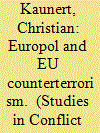

|
|
|
|
|
| Publication |
2010.
|
| Summary/Abstract |
This article offers an analysis of Europol's security actorness in the external dimension of EU counterterrorism. While Europol has attracted some scholarly attention, not so much work has focused on the meaning of its international agreements in counterterrorism. This article aims to investigate the international actorness of Europol at the international level in relation to the fight against international terrorism. It offers original conceptual insights based on empirical case studies of international agreements: Europol agreements with U.S. law enforcement, as well as Europol agreements with countries in the European Neighbourhood policy.
|
|
|
|
|
|
|
|
|
|
|
|
|
|
|
|
| 14 |
ID:
142633


|
|
|
|
|
| Summary/Abstract |
Motivated by neoliberal normativism, the ENP drew on a now outdated mix of political and economic reasoning that does not reflect recent scientific evidence on regional development, and is compromised by having been formulated at arms-length from implementing contexts. An expansion of the ENP discourse that builds upon research findings and sustained feedback with field experts in neighbourhood countries is thought to increase the probability of long-term policy success. Rather than trade liberalisation as the primary stimulant, the results specifically suggest innovation support as the default strategy, and migration policy structures to back labour and capital flows.
|
|
|
|
|
|
|
|
|
|
|
|
|
|
|
|
| 15 |
ID:
166275


|
|
|
|
|
| Publication |
Oxon, Routledge, 2017.
|
| Description |
xiii, 290p.:figures, tableshbk
|
| Standard Number |
9780415670050
|
|
|
|
|
|
|
|
|
|
|
|
Copies: C:1/I:0,R:0,Q:0
Circulation
| Accession# | Call# | Current Location | Status | Policy | Location |
| 059640 | 327.4/HAD 059640 | Main | On Shelf | General | |
|
|
|
|
| 16 |
ID:
083745
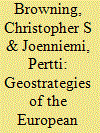

|
|
|
|
|
| Publication |
2008.
|
| Summary/Abstract |
The debate about the European Neighbourhood Policy (ENP) has, in essence, been about borders and bordering. Such departures could contribute - and often do so - to a rather fixed geopolitical vision of what the EU is about and how it aims to run and to organize the broader European space. However, this article aims to retain space for viewing the ENP as a developmental and somewhat fluid process. A conceptual framework, based on outlining three geopolitical models and a series of different geopolitical strategies employed by the EU in regard to its borders, is hence employed in order to be able to tell a more dynamic story regarding the developing nature of the ENP and the EU's evolving nature more generally. The complexity traced informs us that various geostrategies may be held at the same time at the external border. Moreover, the dominance of one geostrategy may be replaced by another or a different combination of them with regard to the same neighbourhood. It is, more generally, argued that if anything it is precisely this dynamism that should be championed as a valuable resource, avoiding the tendency to close off options through the reification of particular visions of the nature of the EU and its borders.
|
|
|
|
|
|
|
|
|
|
|
|
|
|
|
|
| 17 |
ID:
086251


|
|
|
|
|
| Publication |
2009.
|
| Summary/Abstract |
The article examines the impact of the European Neighbourhood Policy (ENP) on domestic change in Ukraine during the period 2005-2007. Due to the interplay of external and domestic factors, no political leadership on European matters emerged in Ukraine under the ENP. The implementation of the Action Plan (AP)-the key instrument of the policy-has been left to the discretion of middle-level state officials, resulting in selective empowerment of sections of the state apparatus. However, without strong political engagement or an effective coordinating mechanism, this delivered slow, uneven and localised results. Nevertheless, despite the limited impact of the ENP, it is through the AP that the European Union has for the very first time started to affect domestic developments in Ukraine.
* The author gratefully acknowledges support from the British Academy (Grant number SG-38537) for research on Ukraine-EU relations under the European Neighbourhood Policy. She would also like to thank Tim Haughton, Iryna Solonenko, Nathaniel Copsey and Olga Shumylo for providing useful comments on the first draft of the article. Different version or sections of the article were presented at the seminar at St Anthony's College, Oxford University in January 2007, at the Wider Europe conference, European Research Institute, University of Birmingham in June 2007, the CREES Annual Conference, Cumberland Lodge, Windsor Great Park, June 2007 and the ICCEES European Congress 'Transcending Europe's Borders: The EU and Its Neighbours' in Berlin in August 2007.
|
|
|
|
|
|
|
|
|
|
|
|
|
|
|
|
| 18 |
ID:
148304
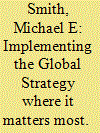

|
|
|
|
|
| Summary/Abstract |
The EU Global Strategy (EUGS) is a broad and ambitious document in terms of its geographic scope and thematic priorities. However, the EU cannot devote equal attention to all aspects of the EUGS; so there is still scope for more clarity regarding the EU’s core strategic aims. This article argues that in addition to fostering internal cohesion, the EU’s strategic priority must involve stabilizing its own neighbourhood. This task has challenged the EU for decades because of an inherent credibility deficit regarding the EU’s own capabilities, yet the EUGS does not diagnose and remedy this problem as effectively as it could have. Therefore much more work will need to be done in terms of reforming EU institutions and developing common capabilities if the EU hopes to achieve its central internal and external security goals as outlined in the EUGS and related policy statements.
|
|
|
|
|
|
|
|
|
|
|
|
|
|
|
|
| 19 |
ID:
180563
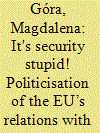

|
|
|
|
|
| Summary/Abstract |
The European Union’s security depends on how stable and peaceful its neighbours are, and yet the security situation around it has been deteriorating in recent years. The EU policies designed to stabilise the neighbourhood – the European Neighbourhood Policy (ENP) and EU enlargement – were originally designed as “low politics” of foreign policy focusing on economic instruments and tools of democratisation, but in time security became a prime concern. The article firstly shows how the European Parliament and national parliaments narrate these challenges in the neighbourhood and how security-related concerns become central to the ENP and enlargement. Secondly, in capturing the security concerns, it also shows how such changes contribute to the politicisation of relations with neighbours and how these processes differ between national and supranational level. Empirically, the politicisation of the ENP and EU enlargement in national parliaments (the UK, Poland and Ireland) and the European Parliament between 2004 and 2014 is compared and analysed.
|
|
|
|
|
|
|
|
|
|
|
|
|
|
|
|
| 20 |
ID:
168955
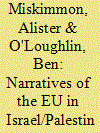

|
|
|
|
|
| Summary/Abstract |
Analysis of narrative can help identify the expectations actors hold about each other in international relations. This article triangulates a mix of elite interviews, media content analysis and an original Q-sort public opinion methodology to map the presence of narratives about EU relations among young Israelis and Palestinians. Our aim is not to explain the effects of EU public diplomacy in these countries. Instead we aim to identify the narrative “terrain” or conditions that the EU communicates to and with and, drawing on feminist and everyday narrative studies, to examine the role of affect and identity to explain why some narratives are more “sticky” than others in those societies. We find, first, a broad recognition that the EU’s capacity to act in international relations is necessary but limited in the face of greater challenges in the international system, and indeed, within the EU itself. We find, second, little evidence that young people radically reshape the narratives they encounter in their public spheres, but nevertheless some important divisions emerge that pose problems for how EU policymakers can communicate consistently without dismaying some citizens in third countries.
|
|
|
|
|
|
|
|
|
|
|
|
|
|
|
|
|
|
|
|
|